

Google’s No. 1 Asset Is Its Ability To Empathize With Its Users Through Design And Product Development. As your Internet use has evolved, Google has evolved with you.

And for you. Its ability to make the right decisions about what to work on and at what time is a testament to the leadership at the company. The latest wave in its evolution comes from Sergey Brin and its new CEO Larry Page, the people who started Google back in 1998. Google Fiber Is The Most Disruptive Thing The Company's Done Since Gmail. Larry Page Outlines His Plan And Vision For Google. Google Needs Sex. What did Google do? Reuters asked for an op-ed on the handover at Google.
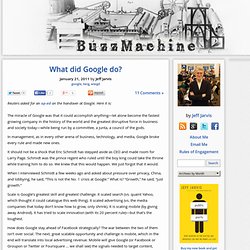
Here it is: The miracle of Google was that it could accomplish anything—let alone become the fastest growing company in the history of the world and the greatest disruptive force in business and society today—while being run by a committee, a junta, a council of the gods. In management, as in every other arena of business, technology, and media, Google broke every rule and made new ones. It should not be a shock that Eric Schmidt has stepped aside as CEO and made room for Larry Page. Schmidt was the prince regent who ruled until the boy king could take the throne while training him to do so. We knew that this would happen. Google’s Six-Front War. Editor’s note: Guest contributor Semil Shah is an entrepreneur interested in digital media, consumer internet, and social networks.
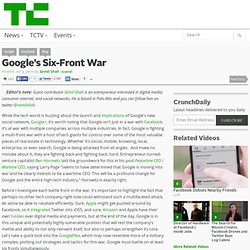
He is based in Palo Alto and you can follow him on twitter @semilshah. While the tech world is buzzing about the launch and implications of Google’s new social network, Google+, it’s worth noting that Google isn’t just in a war with Facebook, it’s at war with multiple companies across multiple industries. In fact, Google is fighting a multi-front war with a host of tech giants for control over some of the most valuable pieces of real estate in technology. Whether it’s social, mobile, browsing, local, enterprise, or even search, Google is being attacked from all angles. With Google, There Will Be Bad Blood. “I have a competition in me.
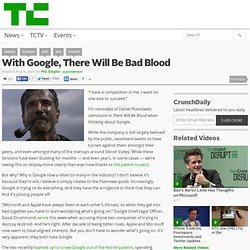
I want no one else to succeed.” I’m reminded of Daniel Plainview’s admission in There Will Be Blood when thinking about Google. While the company is still largely beloved by the public, sentiment seems to have turned against them amongst their peers, and even amongst many of the startups around Silicon Valley. While these tensions have been building for months — and even years, in some cases — we’re seeing this on display more clearly than ever now thanks to the patent issue(s). But why? “Microsoft and Apple have always been at each other’s throats, so when they get into bed together you have to start wondering what’s going on,” Google Chief Legal Officer, David Drummond, wrote this week when accusing those two companies of trying to destroy Android.
The two recently teamed up to screw Google out of the Nortel patents, spending billions to make that happen. The two got so close, that Google then-CEO Eric Schmidt even joined Apple’s board of directors. It’s official: Google wants to own your online identity. Updated.
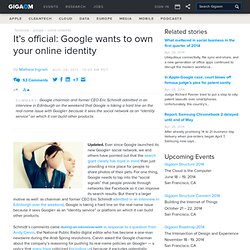
Ever since Google launched its new Google+ social network, we and others have pointed out that the search giant clearly has more in mind than just providing a nice place for people to share photos of their pets. For one thing, Google needs to tap into the “social signals” that people provide through networks like Facebook so it can improve its search results. But there’s a larger motive as well: as chairman and former CEO Eric Schmidt admitted in an interview in Edinburgh over the weekend, Google is taking a hard line on the real-name issue because it sees Google+ as an “identity service” or platform on which it can build other products. Schmidt’s comments came during an interview with in response to a question from Andy Carvin, the National Public Radio digital editor who has become a one-man newswire during the Arab Spring revolutions.
At Google X, a Top-Secret Lab Dreaming Up the Future. Introducing Project Loon: Balloon-powered Internet access. The Internet is one of the most transformative technologies of our lifetimes.
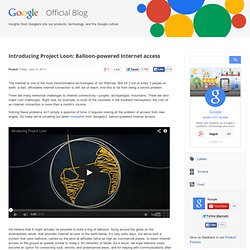
But for 2 out of every 3 people on earth, a fast, affordable Internet connection is still out of reach. And this is far from being a solved problem. There are many terrestrial challenges to Internet connectivity—jungles, archipelagos, mountains. There are also major cost challenges. Right now, for example, in most of the countries in the southern hemisphere, the cost of an Internet connection is more than a month’s income. Solving these problems isn’t simply a question of time: it requires looking at the problem of access from new angles. We believe that it might actually be possible to build a ring of balloons, flying around the globe on the stratospheric winds, that provides Internet access to the earth below. Balloons, with all their effortless elegance, present some challenges.
Now we need some help—this experiment is going to take way more than our team alone. Onward and upward. Project Loon: Google’s biggest obstacle isn’t technology. It’s politics. The balloon-powered network known as Loon may be one of Google’s famed moon shots, but the biggest issues facing the project are grounded right here on Earth.
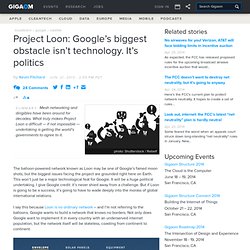
This won’t just be a major technological feat for Google. It will be a huge political undertaking. I give Google credit: it’s never shied away from a challenge. But if Loon is going to be a success, it’s going to have to wade deeply into the morass of global international relations. I say this because Loon is no ordinary network – and I’m not referring to the balloons. Loon would basically become an internet service provider above the clouds. “If the balloons are circling over the bottom half of the world, eventually the balloon that’s over South Africa will pass over South America,” Google captain of moonshots Astro Teller explained in one such video. Well, Iran happens to be at the same latitude as Texas. Since Loon will use radios, it will have to use spectrum, which is tightly regulated by the world’s governments.